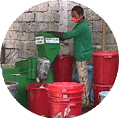  Teoville Subdivision embarked on its solid waste management program in June, 1999. The initiative was borne out of necessity - the need to find a way
to handle their own garbage especially after it became more difficult to find a way to
have their refuse regularly collected. This situation became more alarming given the fact
that sooner or later, landfills will not be able to accommodate the ever increasing solid
waste of Metro Manila. Teoville Subdivision embarked on its solid waste management program in June, 1999. The initiative was borne out of necessity - the need to find a way
to handle their own garbage especially after it became more difficult to find a way to
have their refuse regularly collected. This situation became more alarming given the fact
that sooner or later, landfills will not be able to accommodate the ever increasing solid
waste of Metro Manila.
After studying various strategies of
urban solid waste management schemes, the organization decided to choose close system
composting. This system would enable them to optimize the use of limited space and the use
of containers (drums or barrels) would prevent odor leaks. Lactobacilli was the choice
activator microorganism to speed up the process of decomposition within five to seven days
time.
Today, the operation services 110
households and markets organic fertilizer processed from their biodegradable wastes. They
are also generating additional income from selling of non-biodegradable other dry wastes
such as paper, plastics, glass bottles, and tin cans to junkyard operators. The operation
now employs seven workers including out of school youth.
The commitment of both the
Homeowners and the Paranaque YWCA to provide a practical solution to a very real problem
has been the driving force in the success of this effort. It has brought together the key
actors, the homeowners and the local civic organization, and especially the household
helpers, to work together and make solid waste management a win-win situation.
- distinctive feature (community-based
and locally managed; self-sustaining)
- technology/process/strategy employed
(close system composting using lactobacilli as activator)
- stakeholders (homeowners, YWCA,
out-of-school youth)
- date started/completed (November 1999;
on-going)
- scope/area covered (Teoville
Subdivision, Paranaque; 110 households)
|
basic info | initiative |
strategy |
critical factors |
other links |
home
|

